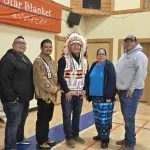
Providing love and light during a dark time
It takes more than a strong stomach and a thick skin to do what Jordi “Angel” Lavallee does for a living – and that’s a big heart.
“I can be in the prep room, alone at night, and have three or four bodies around me,” she said. “It’s not a big deal.”
The newly certified funeral director and embalmer from the Cowessess First Nation says her focus is to provide the best care and support for grieving families.
“I got into this because I wanted to help people,” said Angel. “And because I firmly believe no one has more respect for cultural protocols than we do. So, I think it should be us who are looking after our own people.”
Although her legal name is Jordi, her family calls her Angel. It’s a name she had long before entering her chosen line of work.
As a funeral director and embalmer, she knows her job is somewhat of a mystery to most people, but with any trade it has taken her several years of study to gain her certifications.
An embalmer preserves a body by draining some of the blood and injecting formaldehyde, which gives the body a more peaceful, natural look said Angel. To become an embalmer she spent two and a half years at Saskatchewan Polytechnic to get certified.
Angel, 26, then enrolled at Mount Royal College in Calgary to study funeral direction.
A funeral director arranges the details of a funeral, coordinates the preparation of the body, responds to requests, and communicates with the family, who often are in grief and don’t understand what needs to be don, she explained.
Angel chose to specialize in both disciplines because her goal is to help families from start to finish.
“What really made me want to get into funeral services is when my Mushum John passed away,” she said. “I saw him during his funeral, and he just looked so handsome and peaceful, like he was ready to go on to the spirit world. I just admired the way they looked after him and showed him so much respect. That’s what made me want to get into funeral directing and embalming.”
Naturally, when Angel started on her career path, it raised some eyebrows.
“People thought I was crazy,” she said.
However her mother Carol Lavallee wasn’t surprised at all.
“It’s an odd career to choose for a young lady,” she said. “But I was not shocked because she’s not what you call a normal young lady. She’s more daring and adventurous and thinks outside the box.”
Lavallee fully supported her daughter as she moved towards her- goal.
“I was happy because she chose a career that very few Aboriginal people go into,” she said. “She’s very curious about all the different tribes and customs, and how to bury them properly.”
Carrying out those tribal customs with sensitivity is one of the most rewarding parts of her job, said Angel, but the job also comes with its challenges.
With two young children of her own – Johnna and Kohen – she struggles when arranging a funeral for a young person. To keep herself mentally well, Angel leans on her spirituality and culture to lift her through the darker aspects of her profession.
“The job can be very emotionally draining,” she said. “I smudge and pray every day to take the negative energy on its way. It’s hard at times, but I do my best not to (emotionally) take home my work to my kids and into my home.”
Being one of the few Indigenous funeral directors and embalmers combined with the cultural sensitivity and knowledge she brings to her job; Angel has become quite sought after for her services.
Elders often respond to Angel’s work with warmth and gratitude, said Lavallee.
One day, Angel would like to open her own First Nations funeral home in order to provide the best possible services for her people.
“It’s an honour when people request me to look after them,” she said. “I want to keep doing this work and keep helping people. To show every family the same level of respect, no matter who they are.”

